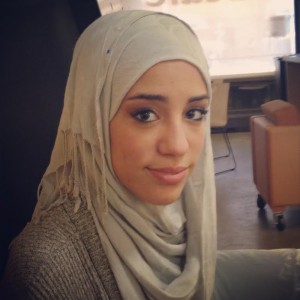Halima Bakillah, a fifth-year biology major, is the founder and president of COEXIST, a Drexel student organization that promotes peace and understanding between different religions.
The Triangle: What’s your story? What brought you to Drexel?

Halima Bakillah: My mom works in the Drexel medical school, so I always felt like I wanted to go to Drexel, but then also, when I was in high school I ended up having to graduate after my junior year because I had too many credits to go into senior year. I only found out like a month before graduation, and by then there wasn’t enough time to do everything to apply to colleges. The only one I could work on was Drexel, and that’s the only one I ended up applying to. Thankfully I got in.
TT: As the founder of COEXIST, how did you get the group started?
HB: When I was in high school, interfaith representatives ended up coming to my mosque, my religious place of worship, and they were interested in getting people to join their interfaith group where they bring four or five students from different congregations and they come together and have meetings and do community service together. I was one of the students who was interested, so I joined. I really liked it, and when I went to college I didn’t see anything like that at Drexel. I started COEXIST with my friends, and that’s basically how it started.
TT: What is the mission of COEXIST?
HB: We’re trying to bring people together, break down the barriers of different cultures and religions. Not every religion has such a diverse population. I guess just breaking down the barriers with them through community service, not just coming together and talking about where you’re from and what you do. Working together to the point where you don’t even remember you’re from different cultures is my main goal.
TT: What do you find is the best way to break the barriers of different religions and cultures?
HB: Working together for something that we all care about but also bringing in conversations about different cultures and pointing out the similarities between them.
TT: Religion can be a very touchy subject. Are you ever faced with any adverse reactions aimed toward the group?
HB: Oh, definitely. There are different types of people that come to these kinds of groups. There are people that come with an open mind and honestly do want to learn about other religions, and then there are other people that come just to disprove other religions. Then there are the types of religions that you don’t see every day. Eventually you just have to keep an open mind. When we start up our meetings, we set ground rules.
TT: What is a typical COEXIST meeting like?
HB: I wouldn’t say that we really have meetings. The only meetings that we really have are with the officers. Everything else we try to make an activity. We don’t just sit in a circle and talk about religion. We really want to have the group meet up if we’re doing activities like community service and social events. We do try to incorporate religious conversation into that. We always try to tie the two together.
TT: Do you work with any of the different religious organizations on campus?
HB: I’m actually a part of the [Drexel] Muslim Students Association, and last year our adviser was Rabbi Isabel [de Koninck], so we had some good connections with the Jewish organizations. Before that, when I founded the organization, the person who was the adviser who was involved was [a pastor] with a Christian organization, [who was great]. He was the one who had originally approached me on starting this interfaith group at Drexel.
TT: Are you involved with anything outside of COEXIST?
HB: I am a part of the MSA. I’m not a really active member, but I try to go to as many events as I can, to show my face kind of thing. I work part-time at Hahnemann [University] Hospital. I love doing that. It’s a little harder because it’s an inner-city hospital, so you get a lot of the inner-city people, people living on the streets. It really opens up your mind. I work at the pain management center, and it’s really hard because we get a lot of the drug-taking patients, for painkillers, and then you also get the people who are really in pain.
TT: If you could trade places with anyone in the world for one day, who would it be and why?
HB: Let’s see — I think I would honestly love to trade places with someone who’s completely disconnected from society. The kind of people who just live in the forest or live alone on an island and can be completely satisfied with everything they need. I’d like to do that. Not for too long, but I’d like to switch spots for a while.
Triangle Talks is a weekly column that highlights members of the Drexel community.


